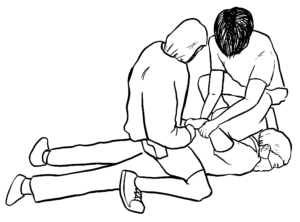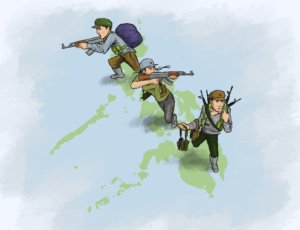A monopoly of families in government

Majority of groups running under the party list system this coming May elections do not represent the poor, contrary to the declared objectives of the party list system. This was the conclusion arrived at by a research made by electoral watchdog Kontra Daya in March.
Apart from having connections with big businesses and the military, party list candidates are characterized as serving as vehicles in electing political families or dynasties. Of the total 177 candidates for the party list system, one out of four represent dynasties.
One of the foremost groups is Tingog Partylist which presents itself as an advocate for the people of Eastern Visayas but, in fact, is an instrument of the Romualdez clan to tighten its control in the region. The party’s incumbent representative and first nominee is the wife of Leyte First District Rep. Martin Romualdez, a cousin of Ferdinand Marcos Jr.
A research by Ibon Foundation show at least 23 members of the Marcos-Romualdez clan have either held power or currently hold positions in the reactionary government.
One of the clan’s patriarch is Mariano Marcos, father of dictator Ferdinand Marcos Sr. He served as a propaganda officer of the fascist organization Kapisanan ng Paglilingkod sa Bagong Pilipinas and the notorious Makabayang Katipunan ng mga Pilipino (Makapili) during the Japanese occupation. These are similar to the right-wing party Kilusang Bagong Lipunan of Ferdinand Marcos Sr. and family.
Families are also represented by other pary list groups such as PDP-Cares (Pimentel), Cibac (Villanueva), Agimat (Revilla), BHW (Co of Ako Bicol), Kusug Tausug (Tan of Sulu) at many others.
The dominance of dynasties is a pervasive feature of the nation’s politics. Around 70%-90% of elected positions are believed to be con-trolled by influential families. In a study on local elections (from municipal/city councilors to governors), every election from 1987 to 2017 saw an additional 170 members of political dynasties getting elected. Ten elections were held during this period.
In 2001, up to 1,303 political dynasties had two members elected in government, 257 families with three members, and 157 families with four or more. This number further increased to 1,548 families with two in office, 339 with three, and 217 with four or more.
After the 2019 election, 80% of governors, or four out of five, have family members also holding elected positions. Moreover, up to 68% of vice governors, and 67% of congressmen, also have relatives in various positions.
Most of the dynasties are in Maguindanao, where more than half of elected positions are occupied by political clans with two or more family members in office. This is followed by Pampanga (49%) and Bulacan (45%).
Some of the political dynasties who retained power after the 2019 elections are the families of Dimaporo in Lanao del Norte; Marcos of Ilocos Norte; Kho of Masbate; Mangudadatu of Maguindanao; Ortega of La Union; and Tan of Western Samar.
“Political dynasties are not bad,” declared Rodrigo Duterte in November 2021 during his visit to the Matugas family’s bulwark in Siargao Island, Surigao del Norte. This declaration is expected of the family that is on top of the heap of dynasties and which gains the most in the monopoly of clans. Three of Duterte’s children hold positions in the local government of Davao City and in Congress.
These families are after these rewards—pork barrel funds, “SOP”, kickbacks, commissions from government contracts and many other forms of corruption. They also gain the most from bribes of capitalists, drug syndicates, smuggling, illegal gambling, and others. These families also use of the military and police as their private armies, aside from the armed goons they directly employ.



